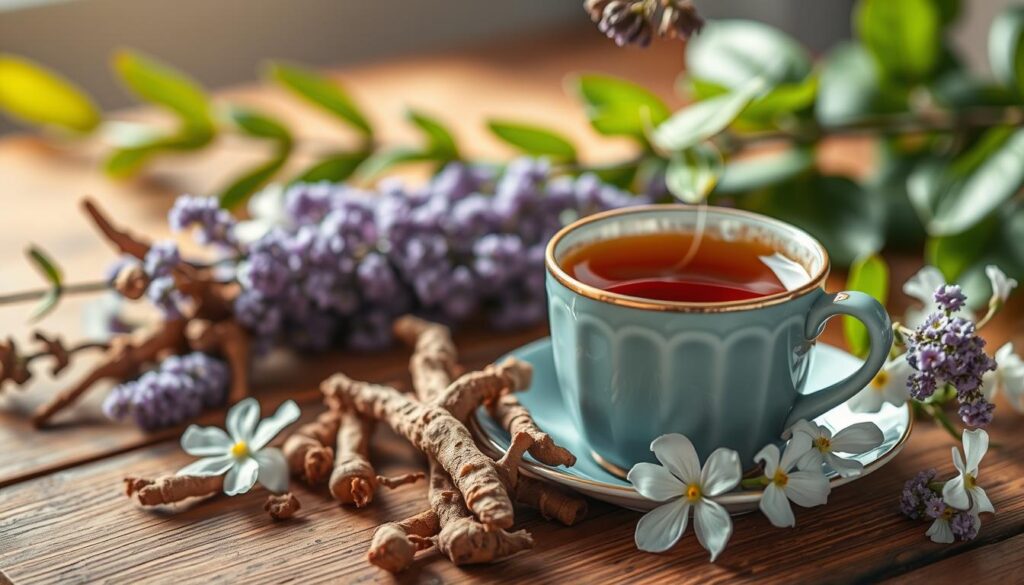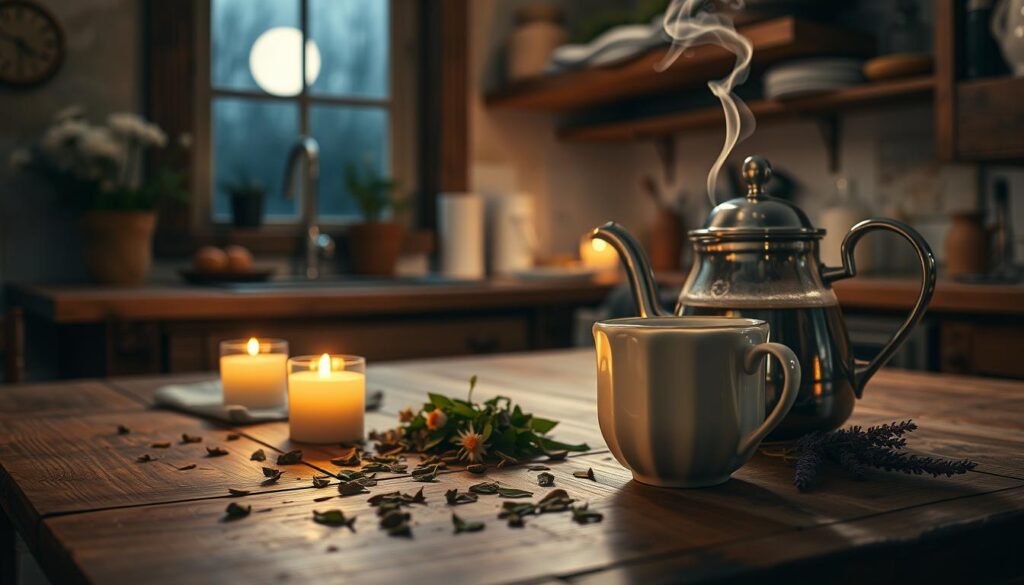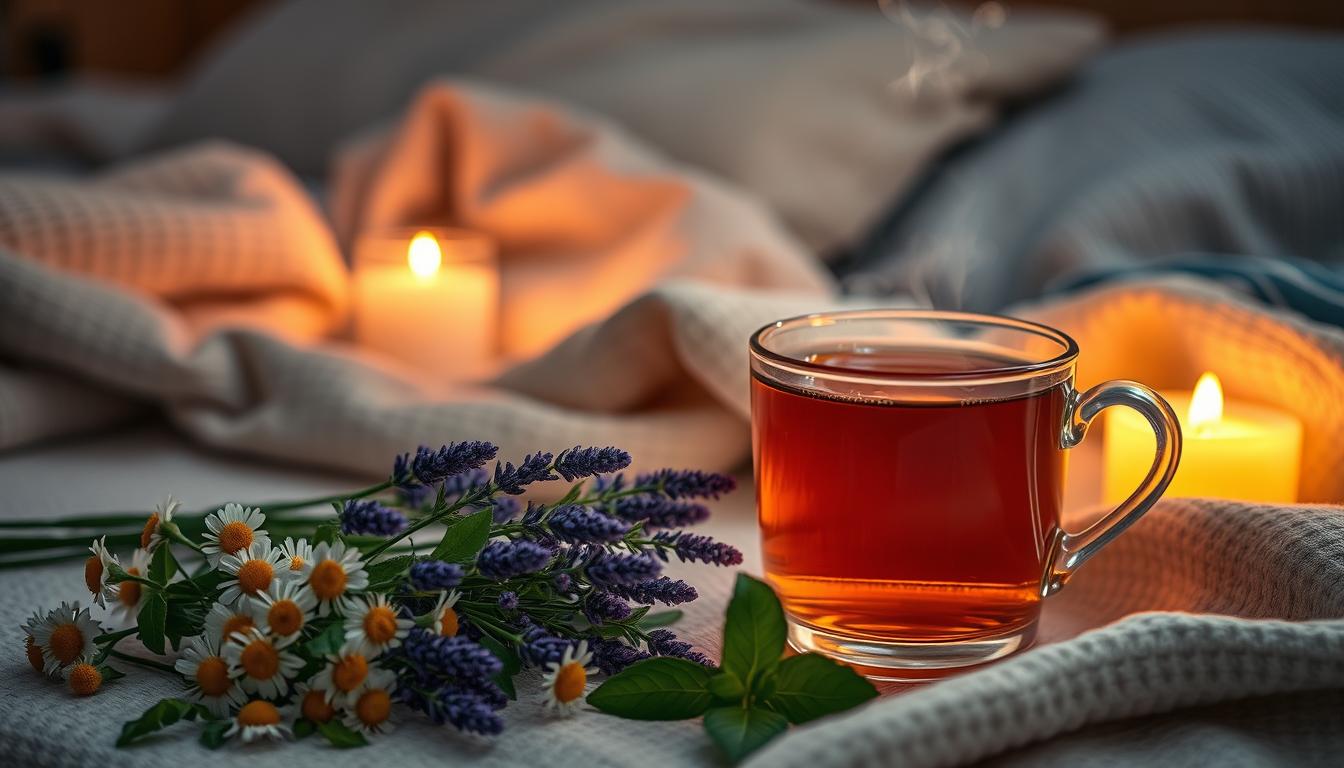Are you tired of tossing and turning in bed? Longing for a blissful night’s sleep? The solution might be as simple as sipping on the right herbal tea. Many natural sleep remedies have been used for centuries. They come in the form of calming, sleep-promoting teas.
But which herbal infusions are truly the best for catching those elusive Zzz’s? Discover the secret to a restful slumber in this comprehensive guide to the finest bedtime teas.
Key Takeaways
- Certain herbal teas, such as chamomile and valerian root, can help you relax and fall asleep more easily.
- Drinking calming teas before bed can combat insomnia, stress, and anxiety, leading to improved sleep quality.
- Herbal sleep remedies have been used for centuries, with research supporting the sleep-promoting properties of many ingredients.
- Exploring different bedtime teas can help you find the perfect blend to suit your unique sleep needs.
- Incorporating a relaxing tea ritual into your evening routine can foster better sleep habits.
But what if drinking tea could be the key to unlocking a restful night’s sleep? Are there certain herbal infusions that truly outshine the rest when it comes to promoting slumber? Dive into this guide to discover the best bedtime teas for a blissful, tranquil sleep.
Introduction to Herbal Teas for Better Sleep
Looking for natural sleep remedies? Your favorite mug might hold the answer. Herbal teas can soothe and improve sleep quality. They offer a calming alternative to traditional sleep aids, helping you relax and sleep well.
The Soothing Power of Herbal Teas
Drinking a warm cup of tea can be calming and comforting. Many herbal teas have compounds that relax the body and mind. They’re a favorite for those seeking natural sleep remedies. Lavender’s floral aromas and valerian root’s earthy notes can help you relax and prepare for sleep.
Importance of Quality Sleep
Quality sleep is key for your health and well-being. Not getting enough sleep can affect your physical, mental, and emotional state. It can cause fatigue, trouble concentrating, mood swings, and even chronic health risks. Herbal teas can support your body’s natural sleep cycle, leading to better sleep.
“A good laugh and a long sleep are the best cures in the doctor’s book.” – Irish Proverb
Herbal teas are a gentle way to relax and enjoy a good night’s sleep. Explore different options to find the perfect blend for you.
Chamomile Tea: A Classic Bedtime Beverage
Chamomile tea is a well-known choice for relaxing before bed. It’s made from dried chamomile flowers. These flowers are known for their calming effects.
Relaxing Properties of Chamomile
Chamomile’s sleep benefits come from its special compounds. One of these is apigenin, which helps you relax and sleep better. It works by calming your brain and reducing anxiety.
Research on Chamomile Tea and Sleep Quality
Studies have looked into how chamomile tea affects sleep. A study in the Journal of Advanced Nursing found it helped new moms sleep better. Another study showed it can improve sleep quality over time, but it might not help with long-term insomnia.
Even though more research is needed, chamomile tea seems to be a good choice for a calming bedtime drink. It can help you sleep better naturally.
Lavender Tea: A Fragrant Slumber Companion
Try the calming scent of lavender tea for a better night’s sleep. Made from lavender flowers, it’s more than just tasty. Studies show it might help you sleep better, making it great for bedtime.
A study on new moms found they felt less tired with lavender tea. This shows lavender’s calming effects can improve sleep. As a calming herbal tea, it’s a great way to sleep better.
“Lavender tea has become an integral part of my bedtime ritual. The gentle floral notes and the sense of calm it provides help me unwind and drift off to sleep with ease.”
More research is needed to fully grasp lavender’s sleep benefits. But, the current findings suggest it’s a good choice for a relaxing bedtime drink. Whether you want to relax or enjoy a nice drink before bed, lavender tea is a great option.
| Benefit | Description |
|---|---|
| Relaxation | The soothing aroma of lavender is believed to promote a sense of calm and relaxation, helping you unwind before bedtime. |
| Sleep Quality | Some studies suggest that drinking lavender tea may enhance sleep quality and duration, potentially leading to more restful and rejuvenating nights. |
| Stress Reduction | As a natural anxiolytic, lavender may help alleviate stress and anxiety, two common culprits behind sleep disturbances. |
Valerian Root Tea: A Powerful Natural Sedative
If you’re looking for a natural way to sleep better, valerian root tea might be what you need. This tea comes from a flowering plant, with its roots dried to make the tea. It’s thought to increase GABA in the brain, helping you relax and sleep better.
Understanding Valerian’s Sleep-Promoting Effects
Many studies have looked into valerian root’s sleep benefits. Some say it can help you fall asleep faster and sleep more soundly. Its calming effects are believed to come from boosting GABA in the brain, making for a restful night.
Precautions with Valerian Tea
- Valerian is usually safe, but talk to your doctor first, especially if you’re on medication or have health issues.
- It might not mix well with some drugs, like sedatives or meds for liver or kidney problems.
- Pregnant or breastfeeding women should avoid it, as its long-term safety is still unknown.
- Some might get headaches, dizziness, or stomach issues from drinking valerian tea.
Start with a small amount of valerian tea and watch how you feel before taking more. Always check with a healthcare expert to make sure it’s right for you.

Passionflower Tea: A Calming Nighttime Infusion
Passionflower, also known as Passiflora or maypop, is a plant with strong medicinal properties. You can find passionflower extract in tinctures and capsules. It’s also used as an herbal supplement. But, you can make a calming passionflower tea by steeping the plant’s leaves. This tea is great for unwinding before bed.
Traditional Uses of Passionflower
For centuries, passionflower has been used in traditional medicine. It’s known for its calming and sedative effects. This makes it a popular natural remedy for sleep benefits. Here are some of its traditional uses:
- Reducing anxiety and promoting relaxation
- Alleviating symptoms of insomnia and improving sleep quality
- Relieving muscle tension and pain
- Treating symptoms of menopause, such as hot flashes and mood swings
- Supporting overall cognitive function and mental well-being
Passionflower’s soothing properties come from compounds like flavonoids, alkaloids, and GABA. These can calm the nervous system.
“Passionflower tea has been used for centuries as a natural remedy for sleep-related issues and anxiety. Its calming effects can help you unwind and prepare for a restful night’s sleep.”
If you want to improve your sleep and relax naturally, try passionflower tea before bed. Its traditional uses and sleep benefits make it a great addition to your herbal teas.
Best herbal tea for better sleep
Choosing the right herbal tea can greatly improve your sleep. Look for caffeine-free options like chamomile, valerian, lavender, and passionflower. These teas are known for their calming effects and help you sleep better.
Choosing the Right Herbal Tea for Your Needs
Focus on herbs with calming properties. Opt for teas made for sleep, as they mix ingredients that help you relax. Think about what you like and any sleep problems you have when picking your tea.
Blending Herbal Teas for Maximum Benefits
Try making your own herbal tea blends for better sleep. Mixing herbs like valerian, passionflower, and lemon balm can boost their sleep benefits. This way, you get a tea that’s just right for you.
| Herbal Tea | Key Sleep-Promoting Compounds | Potential Benefits |
|---|---|---|
| Chamomile | Apigenin, an antioxidant that binds to certain receptors in the brain that may promote sleepiness and reduce insomnia. | Aids in relaxation, reduces anxiety, and may improve sleep quality. |
| Lavender | Linalool and linalyl acetate, compounds that have been shown to have a calming effect on the nervous system. | Promotes a sense of calmness, reduces stress, and may help with falling asleep faster. |
| Valerian | Valerenic acid, which may increase the level of gamma-aminobutyric acid (GABA) in the brain, a neurotransmitter that can have a calming effect. | Traditionally used to treat insomnia and improve sleep quality. |
| Passionflower | Compounds like harman and harmol, which may have a mild sedative effect and help reduce anxiety. | May help with falling asleep faster and improving overall sleep quality. |
By picking and blending the right herbal teas, you can make a sleep tea that’s perfect for you. It will meet your specific needs and tastes.
Creating a Relaxing Bedtime Routine with Tea
Enjoying a soothing cup of herbal tea can be a great addition to your bedtime routine. It helps you establish healthy sleep habits and better sleep hygiene. Drinking tea before bed tells your brain it’s time to relax.
To create a relaxing bedtime routine with tea, consider these tips:
- Set a consistent sleep schedule and stick to it, even on weekends. Going to bed and waking up at the same time each day can help regulate your body’s natural circadian rhythms.
- Limit your intake of caffeine, especially in the hours leading up to bedtime. Opt for caffeine-free herbal teas like chamomile, lavender, or passionflower instead.
- Establish a calming pre-bed routine that includes sipping a warm cup of herbal tea. This can help signal to your body that it’s time to relax and prepare for sleep.
- Experiment with different herbal tea blends to find the ones that work best for you. Some teas like valerian root may have a more potent sleep-promoting effect.
By creating a consistent bedtime routine with tea, you can cultivate healthy sleep habits and enjoy a more restful, rejuvenating night’s sleep. Sipping on a comforting cup of herbal tea can be a soothing way to wind down and prepare your body and mind for a good night’s rest.
Preparing and Enjoying Your Herbal Bedtime Tea
Making the perfect herbal tea for sleep is an art. It helps you relax and get ready for a good night’s sleep. With a few easy steps, you can enjoy the flavors and benefits of these calming teas.
Tips for Brewing the Perfect Cup
First, heat your milk or water to the right temperature. It should be hot but not boiling. This keeps the herbs’ flavors and benefits intact.
Next, put your tea bag or loose leaves in the cup. Let it steep for 5-6 minutes. This lets the flavors mix well. Remember to cover your cup to keep in all the scents.
Customizing Your Tea with Additional Ingredients
- Add a bit of honey to sweeten your tea and make it more calming.
- Try vanilla extract or a cinnamon stick for a cozy, warm taste.
- For creaminess, froth some warm milk and mix it into your tea gently.
Drink your special herbal tea in a calm place to get ready for sleep. Enjoying these teas can be a great way to relax and get ready for bed.

“A good night’s sleep is essential for our overall health and well-being. Incorporating herbal teas into your bedtime routine can be a natural and effective way to promote relaxation and improve sleep quality.”
Benefits of Drinking Herbal Tea for Sleep
Herbal teas are known for their ability to help you relax and sleep better. They are full of aromatic compounds and natural ingredients. These teas offer many benefits that can help you sleep peacefully.
Promoting Relaxation and Reducing Stress
Herbs like chamomile, lavender, and valerian are used in sleep teas. They are calming and can reduce stress and anxiety. Drinking a warm herbal tea can signal to your brain that it’s time to relax.
Enhancing Sleep Quality and Duration
Herbal teas can also improve your sleep quality and duration. Valerian root, for example, has mild sedative effects. It can help you fall asleep faster and sleep more soundly.
Adding herbal tea to your bedtime routine can greatly improve your sleep. Try different teas to find the one that helps you relax and sleep well.
“Drinking herbal tea before bed is a ritual that has been practiced for centuries to promote relaxation and better sleep. The natural ingredients in these teas can have a profoundly calming effect on the mind and body.”
Potential Side Effects and Precautions
Herbal teas are usually safe, but it’s good to know about possible side effects of herbal tea. Some herbs, like valerian root, might cause headaches, dizziness, or skin issues in a few people. If you’re pregnant, breastfeeding, or on medication, talk to a doctor first. This is because some herbal teas might interact with prescription drugs or affect a growing baby.
Considerations for Specific Conditions and Medications
People with certain health issues or on specific meds should be careful with herbal teas. For example, those with liver or kidney problems might need to avoid certain herbs. Others with hormonal or mental health issues should watch out for herb-drug interactions. Always check with a doctor before trying herbal teas, especially if you have health concerns or take prescription drugs.
| Herbal Tea | Potential Side Effects | Precautions |
|---|---|---|
| Valerian Root Tea | Headaches, dizziness, skin reactions | Not recommended for pregnant or breastfeeding women, or those taking sedatives or antidepressants |
| Chamomile Tea | Allergic reactions (in people with ragweed or daisy allergies) | Avoid if you have a history of allergies or are taking blood thinners |
| Lavender Tea | Headaches, nausea, constipation (in high doses) | Not recommended for people with hormone-sensitive conditions, such as breast cancer or endometriosis |
Herbal teas can help with relaxation and sleep, but use caution. Always talk to a healthcare professional, especially if you have health issues or take meds.
Conclusion
Adding herbal teas to your bedtime routine can help you sleep better. Teas like chamomile, lavender, and valerian root can calm you down. They help reduce stress and make it easier to fall asleep.
By picking the right herbal tea and good sleep habits, you can sleep better. This makes you feel refreshed and ready for the day.
This article shows how herbal teas can improve your sleep. Chamomile and valerian root teas are great for relaxing and sleeping. They are natural ways to fight insomnia and enhance sleep quality.
It’s important to try different herbal teas to find what works for you. This way, you can choose the best tea for your sleep needs.
As you work on getting better sleep, enjoy a warm herbal tea before bed. Let the flavors and smells calm you down. This helps you relax and sleep well.
With the tips from this article, you can pick the perfect herbal tea for a good night’s sleep. Start your bedtime routine with a soothing cup of tea. It’s a great way to unwind and prepare for restful sleep.

